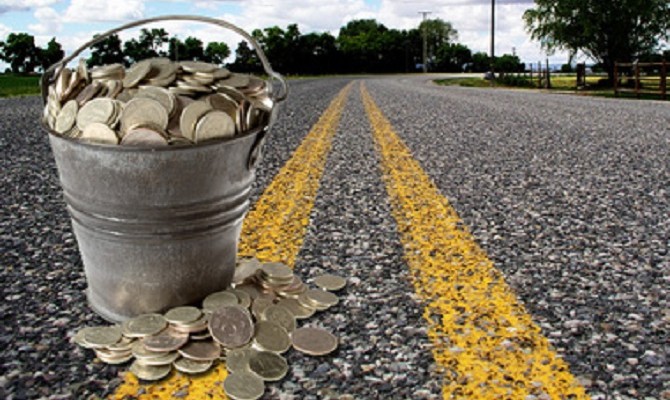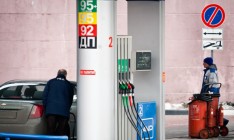Economy
InfrastructureForeigners will pay for travel on Ukrainian roads

The Cabinet of Ministers has found new sources of funding for the maintenance of Ukrainian roads. Already in 2016 the repair of roads will be partially assigned to foreigners coming to Ukraine for business or on private visits. Recently, the Ministry of Infrastructure developed a tariff grid for commercial vehicles, including trucks and buses crossing the Ukrainian border. As it can be seen from the bill drafted by the ministry, vehicles weighing 3.5 - 40 t will be charged €0.04 per 1 km. This means that, for example, truck drivers transporting cargo through Ukraine and overcoming the distance of 1,300 km will have to pay €52 (approximately UAH 920 at the current rate). For heavy vehicles weighing over 52 t the minimum rate will be €0.54 per 1 km.
Entitled to benefits
The law on collection of a toll at checkpoints on the state border, including for travelling around the country, was adopted 15 years ago. The law says that payment is made based on the rates per 1 km. Currently these rates are two times lower than those proposed by the Ministry of Infrastructure. As Director of the Department of Transport Policy at the Association of International Road Transport Carriers of Ukraine (AsMAP) Valentyna Malchevska explained in a conversation with Capital, Ukraine signed transportation agreements with many countries. These agreements usually provide reciprocal exemption from tolls, except for toll roads, which are still to be built in our country. “The toll is collected only if the dimensions or weight parameters are violated, regardless of the origin of the carrier,” says Malchevska. This being said, there are no such agreements with a number of countries, such as Germany, Austria or Italy.
An absolute novelty of the ministry is charging vehicles for entry and staying on the territory of Ukraine with a maximum permissible weight of up to 3.5 t. In this case, it is strictly about vehicles registered outside of Ukraine. The suggested rate for foreigners entering Ukrainian territory in passenger cars is €2 per day, €7 per week, €25 per month, €120 for six months and €200 a year. However, according to the interlocutor from AsMAP, given the current state of the roads it is not very appropriate to charge foreigners for questionable or poor services.
The rise in fees for carriers with whose countries Kyiv did not agree on mutual exemption from road tolls may also affect the transit prospects for Ukraine. However, as it was noted by Director of the Center of Transport Policies Serhiy Vovk, due to the military operations in the Donbas region the transit flow of cargo from Europe has already shifted from the Ukrainian border to the Belarusian border.
Keep it simple
The practice of tolls for commercial transport exists almost in all European countries, the interviewed experts confirm.
“Commercial vehicles cause more damages to roads than passenger cars. And this loss is not compensated by the excise duty on fuel,” says Coordinator of Restructuring of the Transport Sector at the Coordination Center for Implementation of Economic Reforms Oleksandr Kava. The expert pointed out that the bill proposed by the Ministry of Infrastructure does not provide such a simple mechanism as the calculation of the distance passed by vehicles for which the fee is charged. “The bill ties the rate to kilometers, but the document does not provide any mechanism of its calculation,” said Kava. Until recently, according to Malchevska, calculation of fare was made on the basis of routes indicated by carriers or offered at the Ukrainian border. But it is almost impossible to trace the actual movement of a truck in this case. Therefore, as Kava noted, there is an option of equipping vehicles with GPS systems on the border, which will calculate the routes and follow the movement of the vehicles. “Given the existing GPS coverage system, I believe there will be no difficulties with the use of trackers,” emphasizes the source.
On the other hand, the GPS tracking system will cost the government much more than payment of tolls in the process of crossing the border. In Belarus, where trackers have been used on toll roads since last year, the installation of such a system cost €267 mn (approximately UAH 4.8 bn).
Ulterior motive
In recent years the Ministry of Infrastructure has taken numerous attempts to find alternative sources of financing for road repairs. A bit earlier the ministry drafted a bill for introduction of tolls for transport with a mass of over12 t. Annual revenues should amount to UAH 4 - 8 bn, depending on the payment rate. At the same time, this does not apply to all roads, only to those that stretch for 21,000 km. The ministry does not specify the revenues that such innovations will generate to the budget. However, both initiatives are justified by the need to compensate damages caused to the road surface by commercial transport vehicles.
There is another motive, which is more banal. Financing provided by the national budget is too scarce. The amount is too small not only for the construction of roads, but also for their repair. According to Minister of Infrastructure Maksym Burbak the national budget envisages UAH 15 bn of the required UAH 32 bn for maintenance of 170,000 km of roads. And Ukravtodor will need UAH 10 bn of this amount for servicing previously borrowed loans. Therefore, there will be almost no funds left for the highway and road infrastructure.






 of the agreement of syndication with Financial Times Limited are strictly prohibited. Use of materials which refers to France-Presse, Reuters, Interfax-Ukraine, Ukrainian News, UNIAN agencies is strictly prohibited. Materials marked
of the agreement of syndication with Financial Times Limited are strictly prohibited. Use of materials which refers to France-Presse, Reuters, Interfax-Ukraine, Ukrainian News, UNIAN agencies is strictly prohibited. Materials marked  are published as advertisements.
are published as advertisements.